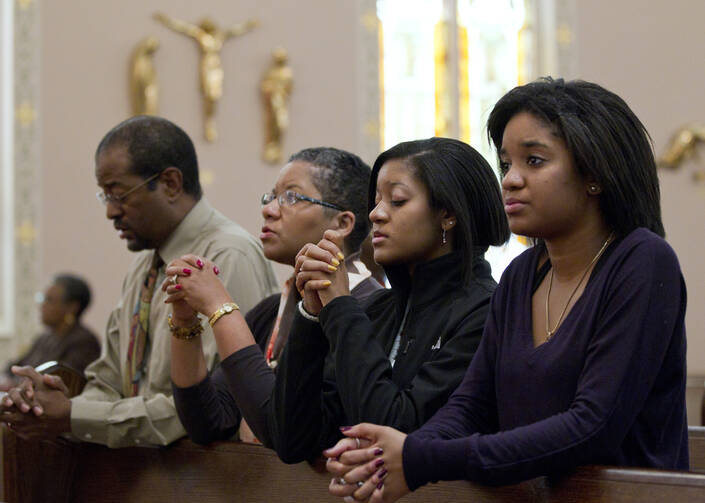Pope Francis’s apostolic exhortation, “Amoris Laetita," presents, at considerable length, his reflections and discernment based upon the two synods devoted to the Catholic understanding of marriage and family life.
It is clear, even from a first reading, how closely the pope has entered into dialogue with the documents (the relationes) produced by the synods of 2014 and 2015. He quotes from both extensively. As he himself writes: “The various interventions of the Synod Fathers, to which I paid close heed, made up, as it were, a multifaceted gem reflecting many legitimate concerns and honest questions. For this reason, I thought it appropriate to prepare a post-synodal Apostolic Exhortation to gather the contributions of the two recent Synods on the family, while adding other considerations as an aid to reflection, dialogue and pastoral practice, and as a help and encouragement to families in their daily commitments and challenges” (No. 4).
“Amoris Laetitia” represents, then, the rich harvest that the pope has gleaned from the weeks of synodal deliberations and discernment, as well as from the considerable number of written interventions and the two final reports. This is how he orients the reader to the document at hand: “
Given the rich fruits of the two-year Synod process, this Exhortation will treat, in different ways, a wide variety of questions. This explains its inevitable length. Consequently, I do not recommend a rushed reading of the text. The greatest benefit, for families themselves and for those engaged in the family apostolate, will come if each part is read patiently and carefully, or if attention is paid to the parts dealing with their specific needs (No. 7).
Let me underscore these two points. First, the document is, indeed, lengthy—over 50,000 words in the English translation and does not lend itself to a quick read—so beware headlines purporting to give the real “low down.” Second, the document’s nine chapters are like mini-treatises that can well serve as discrete soundings of different aspects of the beauty, promise and challenge of the Christian vision of marriage and family life.
Thus, for example, Chapter 4, “Love in Marriage,” is an extended spiritual reading of the “Hymn to Agape” in 1 Corinthians 13 (chosen by so many couples as a reading for the liturgy of marriage). In his meditation, the pope converts what at times is a sentimental option into a deep pondering of the overwhelming mystery of divine and human love.
Chapter 7, “Toward a Better Education of Children,” offers wonderful insights by a master pedagogue on the challenging and indispensable role of the family in the Christian formation and moral education of their offspring—often in face of a society propagandizing contrary values.
In highlighting these chapters I wish to call attention to two features of Francis that permeate his teaching. One encounters everywhere the refined sensibility and long experience of the Jesuit spiritual director and educator.
In addition, the rich considerations of these chapters will doubtless receive but short shrift from the secular media, avid to reduce the nuanced whole to some headline-grabbing phrase or garbled assertion.
As accomplished educator and spiritual director, Pope Francis is acutely aware of pedagogical and spiritual process and progress. Hence his impassioned plea for the need to accompany and support. But he is equally clear about the impediments, both personal and cultural, that can block or derail growth to maturity and authenticity. Chapter 2, “The Experiences and Challenges of Families,” and Chapter 6, “Some Pastoral Perspectives,” confront and critique those challenges at some length.
Thus, in Chapter 8, entitled “Accompanying, Discerning, and Integrating Weakness,” the pope significantly insists:
In order to avoid all misunderstanding, I would point out that in no way must the Church desist from proposing the full ideal of marriage, God’s plan in all its grandeur … A lukewarm attitude, any kind of relativism, or an undue reticence in proposing that ideal, would be a lack of fidelity to the Gospel and also of love on the part of the Church for young people themselves. To show understanding in the face of exceptional situations never implies dimming the light of the fuller ideal, or proposing less than what Jesus offers to the human being. Today, more important than the pastoral care of failures is the pastoral effort to strengthen marriages and thus to prevent their breakdown (No. 307).
The pope (I contend) recognizes the “graduality” of growth, not of the goal.
Ultimately, the heart of “Amoris Laetitia” is its proclamation of the transcendent beauty and joy of the marriage of a man and woman in Christ and the generous and fecund family life that issues from their love. Let no commentary distract, much less detract, from this stupendous reality that Pope Francis, in company with the synod participants, celebrates: Christian marriage—at once erotic, sacramental and fruitful in Christ.
Taste and savor—slowly—Love’s Joy.








